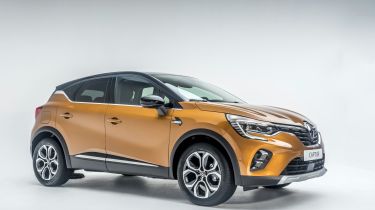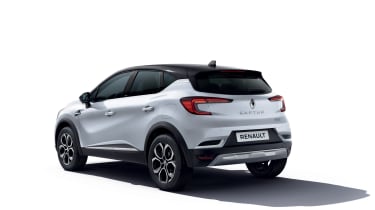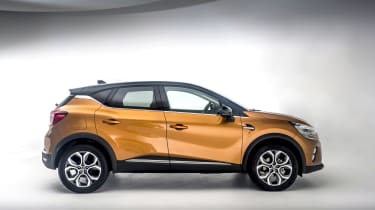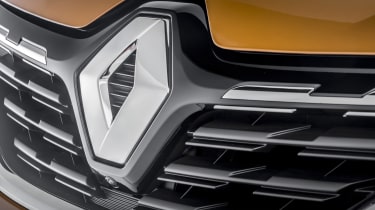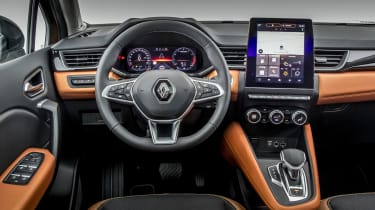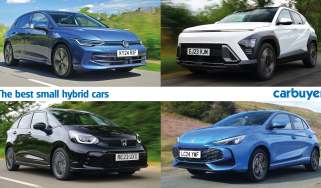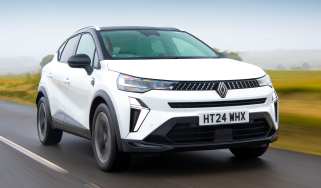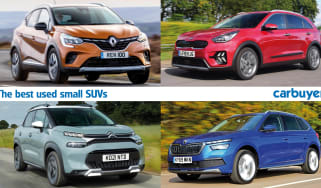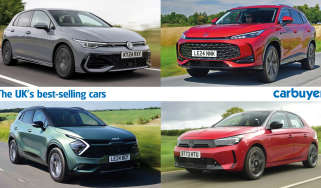2020 Renault Captur: prices, specs and PHEV details
The Renault Captur E-Tech PHEV is now on sale starting from £30,495
The 2020 Renault Captur E-Tech plug-in hybrid is now on sale in the UK priced from £30,495. It’s the first PHEV version of the firm’s smallest SUV, and is capable of up to 30 miles of range and a top speed of 83 mph when running in EV mode.
The second-generation Renault Captur crossover-SUV arrived last year with an array of new technology, including a digital cabin and new safety features helping it to stay competitive against rivals including the Nissan Juke, Skoda Kamiq and Peugeot 2008.
2020 Renault Captur E-Tech
The Renault Captur E-Tech is the first plug-in hybrid version of the firm’s smallest SUV. It combines a four-cylinder 1.6-litre petrol engine and two electric motors with a 9.8kWh battery pack and a multimode direct-transmission gearbox. Renault claims that the E-Tech is capable of 30 miles of pure-electric running at speeds of up to 83mph. It’s the most fuel efficient model in the Captur line-up, officially capable of up to 188mpg while emitting 34g/km of CO2.
The car features several driving modes to best make use of the power options. ‘Pure’ forces the car to run on electric power (if there’s enough charge in the battery), 'Sport' sees the engine and electric motors combine for maximum performance, while 'E-Save' keeps the battery charge for later on in your journey.
As the flagship model in the Captur range, the E-Tech starts at £30,495. It boasts a 10-inch digital instrument cluster and a 9.3-inch touchscreen infotainment screen. Both feature display setups unique to this model giving information on battery charge level, charging times and the amount of energy recovered to the battery when you're driving. Every Captur PHEV includes a free 7kW home wallbox charger.
While the car’s interior practicality remains identical to the petrol and diesel models, the boot-mounted battery does affect luggage space, reducing it from 526 litres to 379 litres.
2020 Renault Captur: prices and specifications
The entry-level Captur starts from £17,595, and gets 17-inch steel wheels with hubcaps, a four-speaker stereo system and USB ports. Standard safety equipment includes lane keep assist, lane departure warning, active emergency braking, traffic sign recognition, cruise control and a speed limiter.
Standard equipment across the Renault Captur range includes automatic windscreen wipers, automatic climate control, a leather-trimmed steering wheel, a 4.2-inch TFT screen in the dial cluster and a seven-inch infotainment screen with Apple CarPlay and Android Auto connectivity.
The mid-range Captur Iconic is priced from £19,095 adding 17-inch alloy wheels, two-tone paintwork, rear privacy glass, rear parking sensors, LED front fog lights, sat nav and roof bars.
The Captur S Edition starts at £20,595 adding 17-inch diamond cut alloy wheels, front parking sensors, a rear-view camera and automatic headlights. On the inside buyers get seats trimmed in synthetic leather, ambient interior lighting, a seven-inch digital dial cluster and a larger portrait style 9.3-inch infotainment touchscreen.
Additional cost options for the new 2020 Renault Captur include a larger 10-inch digital dial cluster (£250), an array of interior personalisation colour options and Renault’s Traffic and Motorway Assistance Pack (£600), adding adaptive cruise control, a 360-degree view monitor and a blind spot monitoring system.
Design, practicality and chassis
Among the exterior design tweaks, the front of the Captur features new LED headlights, which will be standard fit across all trim levels. Other changes to the front of the car include a more angular bonnet and a restyled front bumper with new air intakes featuring silver accents. At the back, a new set of C-shaped LED rear lights feature along with a lightly restyled bumper and tailgate.
Renault says that the new Captur can be specced in 11 different exterior colours and four different contrasting roof finishes, meaning buyers can pick from 90 different colour configurations.
The new car is bigger, gaining 110mm in length, 20mm additional width and a slight height increase to make it more practical. Boot space stands at 536 litres, an increase of 81 litres over the current Captur.
These gains come from the new CMF-B platform that underpins the forthcoming Captur. This platform is shared with the new Clio hatchback, and is lighter and stiffer than the current car’s underpinnings, which should improve both refinement and handling.
Engines and performance
The remainder of the Captur range can be specced with a choice of three petrol and two diesel engines. The range-topping four-cylinder 1.3-litre TCe petrol engine is available in either 129bhp or 153bhp power outputs. Both versions can be specced with a seven-speed dual-clutch automatic gearbox, with a six-speed manual available on the lower-powered variant. An entry-level 99bhp three-cylinder 1.0-litre TCe petrol model with a five-speed manual gearbox is also available.
A four-cylinder 1.5-litre Blue dCi diesel engine will suit higher mileage drivers, and is available with 95bhp or 115bhp. Both come with a six-speed manual gearbox. An optional seven-speed automatic can be specced on the most powerful version.
Interior and technology
Inside, the interior of the Captur has a completely redesigned dashboard with a new centrally-mounted 9.3-inch infotainment display. This comes with both Apple CarPlay and Android Auto. The analogue dials have been replaced with a 10.2-inch digital dial cluster. This dual-display setup will be an option on lower trim level models, which will get a pair of seven-inch displays as standard.
One interesting new interior feature is the floating centre console that increases the amount of interior storage space and houses a wireless smartphone charging pad. A useful feature carried over from the outgoing car is the sliding rear seat bench, which gives up to 16cm of back and forth adjustment, helping to maximise rear passenger legroom or boot space.
Want to know more about hybrid SUVs? Why not check out our picks for the best hybrid SUVs you can buy.
Recommended
Most Popular
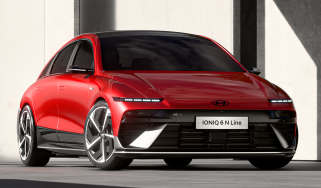
Hyundai Ioniq 6 gets steely-eyed styling overhaul for mid-life update
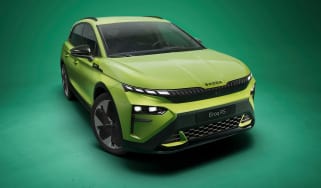
Hot Skoda Elroq vRS is its fastest accelerating car ever
Tips & advice

Car dashboard warning lights: what does each symbol mean?

Electric car charging stations: public networks, charger types, apps and maps


